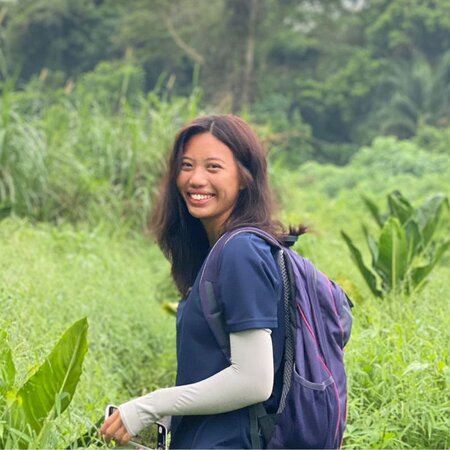For Cassandra Yip-Lee, founder of Earth School Singapore, the importance of having education and sustainability meet is essential in learning the value of living sustainably and understanding why it’s a necessity. That’s why by building Singapore’s first school for environmental education, she, along with her team of passionate environmentalists, hopes to spread environmental literacy, awareness, and action among Singaporean youth.

Cassandra Yip-Lee founded Earth School Singapore with the hopes of making environmental education more accessible to children and the youth.
Cassandra started feeling passionate about nature through the influence of her parents who are “huge marine enthusiasts”. At a young age, she was exposed to the ocean and marine life constantly; this fueled her fire to pursue a career related to protecting these natural sanctuaries. In university, she graduated with a degree in Environmental Studies.
In 2021, she participated in the #WeGotThis programme run by WWF-Singapore and Temasek Foundation. This experience, along with her personal interest in the area, further inspired to her be instrumental in shaping new nature-lovers through Earth School.
Why is environmental education so important?
Earth School Singapore is a social enterprise that runs programmes and educational classes that allow for active learning and participation related to environmental concerns and issues. Children, young adults, and people of all ages are welcome to join these classes and sessions, which are conducted along with Earth School’s many eco-focused partners.
Cassandra shared that she could’ve started her journey as a young environmentalist even earlier if nature-based careers were “as accessible or encouraged as much as becoming a doctor or a lawyer.” Through Earth School, she hopes to “create opportunities for children to pursue more environmental-related dreams” and allow them to “contribute to building a more sustainable future”.
She also said that one of the most helpful things that helped Earth School grow its impact was taking part in #WeGotThis. Developed by WWF-Singapore and Temasek Foundation, #WeGotThis is a global youth sustainability incubator programme that equips youths with the skills, knowledge, and tools for sustainability, innovation, and digital advocacy so that they can build up a following, reach out to peers and the larger community, and drive change via their own social media platforms.
Changing perspectives about sustainability
Cassandra said: “To me, living sustainably is simply about refusing to partake in mindless consumerism — instead making more conscious choices, and leading a more meaningful life.”
However, she recognises that some people’s failure to recognise the need to understand and participate in this lifestyle roots from two extremes.
“Someone once said that 'privilege is invisible to those who have it’,” she said. “So perhaps those who believe that the climate crisis isn't serious are the same ones who have been so privileged in this life to not to have felt the impact of our changing climate or have seen first-hand the horrors of environmental degradation.”
On the other side of the spectrum, she added: “[However,] if your definition of sustainable living is a simple, non-extravagant life, then by default, poor or marginalised communities are living sustainably, because a life of sustenance is all they can afford.”
That’s why “sustainable living” and “sustainability” aren’t concepts that should be easily thrown around because there are other issues surrounding them. It’s not just about elitism or marginalisation; sustainability is about finding the balance between these two completely different ends and learning to correct and address what’s wrong with both, as well as everything in the middle. It circles back to proper education on the matter.
https://www.instagram.com/p/CYQ_sKIv2ZN/
“I think not a lot of people realise that tensions and conflicts are often over critical resources needed to support life. Food, water, energy. In addition, many human rights issues, such as hunger and refugee crises, stem from the lack of natural resource provision due to general scarcity or pollution,” said Cassandra.
Turning education to action
That’s why Earth School has guides on almost every topic related to sustainability and sustainable development that are easy to integrate into one’s day-to-day routine. These guides cover things like thrift shopping and green restaurants, as well as Singapore spaces showcasing local biodiversity. Its programmes also encourage participation not just from individuals but also groups of friends or families.
“Environmentalism is multi-dimensional. There are so many different stories to tell and causes to champion,” said Cassandra, with high hopes that through Earth School’s programmes, participants will find a cause or topic that speak closer to their hearts.
She added that talking to fellow advocates about their own environmental education experience is “extremely valuable” since “hearing new perspectives” allow her to understand and learn more about issues. In turn, these conversations are passed from one person to the next, hopefully resulting in a positive domino effect on bigger sustainability-driven actions.
"We build collaborations for greater environmental advocacy this way, which is what made the #WeGotThis programme last year so meaningful," she also shared. She explained that being able to "take guidance and mentorship from leading environmentalists was invaluable" and it even furthered her knowledge and understanding of the issues at hand even wider.
“We might not be able to influence the outcome of a war, or prevent a financial downturn, but we can still make the world a better place by living more sustainably. It's our own small, personal contribution to leaving our planet with enough resources for future generations to live on.”
Comments, questions or feedback? Email us at [email protected].








